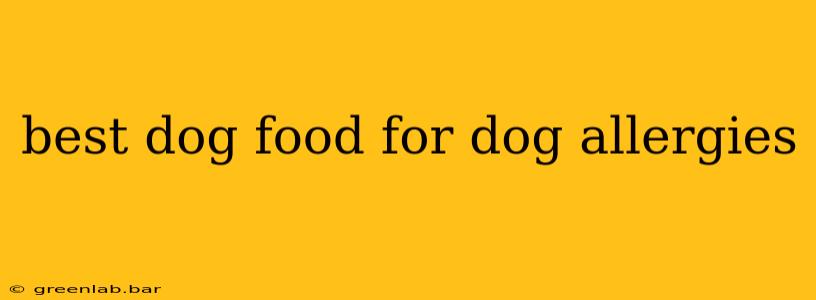Dealing with a dog allergy can be incredibly frustrating for both you and your furry friend. Itchy skin, digestive upset, and constant scratching are not only uncomfortable but can significantly impact your dog's quality of life. Finding the right food is crucial in managing these symptoms, but navigating the vast world of hypoallergenic dog food can be overwhelming. This guide will help you understand dog allergies, identify the best types of dog food for allergic reactions, and offer tips for selecting the perfect diet for your canine companion.
Understanding Dog Allergies
Before diving into specific food recommendations, it's essential to understand the different types of allergies your dog might be experiencing. Dog allergies are generally categorized into three types:
-
Food Allergies: These are reactions to specific proteins found in dog food, such as beef, chicken, dairy, or soy. Symptoms can range from mild skin irritation to severe gastrointestinal distress.
-
Environmental Allergies: These are reactions to substances in the environment like pollen, dust mites, or mold. While food doesn't directly cause these allergies, dietary changes can sometimes help manage related symptoms by boosting skin and coat health.
-
Contact Allergies: These are reactions to substances that come into direct contact with your dog's skin, such as certain fabrics, cleaning products, or flea and tick treatments. Again, diet can play a supporting role in skin health.
Identifying the Culprit: Diagnosing Dog Allergies
Diagnosing a food allergy requires a visit to your veterinarian. They will perform a thorough physical examination, review your dog's history, and may recommend allergy testing or an elimination diet. An elimination diet involves feeding your dog a novel protein (one they've never consumed before) for 8-12 weeks to see if symptoms improve. If symptoms clear up, the vet will then gradually reintroduce other proteins to identify the specific allergen.
Types of Hypoallergenic Dog Food
Once your vet has identified the allergen(s), choosing the right food becomes much easier. Several types of hypoallergenic dog food are available:
1. Hydrolyzed Protein Diets:
These diets use proteins that have been broken down into smaller peptides, making them less likely to trigger an allergic reaction. Because the protein structure is altered, the dog's immune system doesn't recognize it as an allergen. These are often recommended for dogs with severe allergies.
2. Novel Protein Diets:
These diets utilize protein sources your dog has never eaten before, such as venison, rabbit, kangaroo, or duck. The idea is to introduce a protein that's unlikely to trigger a reaction. Success depends on your dog's previous exposure to various proteins.
3. Limited Ingredient Diets:
These diets contain a very small number of ingredients, typically a single protein source and a single carbohydrate source. This makes it easier to pinpoint any potential allergens. They are often a good starting point for elimination diets.
Choosing the Right Dog Food: Key Considerations
When selecting hypoallergenic dog food, consider these factors:
-
Protein Source: Choose a protein source your dog hasn't consumed before or one identified as safe by your veterinarian.
-
Ingredient Quality: Opt for high-quality ingredients with minimal fillers and artificial additives.
-
Nutritional Completeness: Ensure the food meets the Association of American Feed Control Officials (AAFCO) standards for nutritional adequacy.
-
Your Dog's Life Stage: Choose a formula appropriate for your dog's age and activity level (puppy, adult, senior).
-
Your Budget: Hypoallergenic dog food can be more expensive than standard brands.
Beyond Food: Managing Dog Allergies
Dietary changes are crucial, but managing dog allergies often requires a multi-faceted approach:
-
Regular Grooming: Regular brushing can help remove allergens from your dog's coat.
-
Bathing: Using a hypoallergenic shampoo can help soothe irritated skin.
-
Environmental Control: Minimizing exposure to known allergens in your home can significantly reduce symptoms.
Conclusion: A Healthy Future for Your Allergic Dog
Finding the right food for your dog's allergies may take time and patience, but it's a critical step toward improving their health and comfort. Working closely with your veterinarian, following their recommendations, and carefully selecting a high-quality hypoallergenic dog food will pave the way for a happier, healthier life for your furry friend. Remember, consistency is key – stick to the recommended diet to see lasting positive changes.

